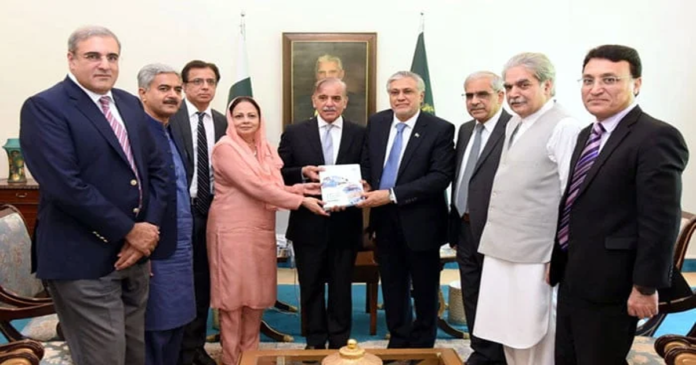Ishaq Dar, the federal minister of finance and revenue, officially unveiled the Pakistan Economic Survey 2022–23 on Thursday during a press conference in Islamabad.
Government unveils Pakistan Economic Survey: The finance minister discussed the performance of several economic sectors during the previous fiscal year at a press conference where he unveiled the Pakistan Economic Survey 2022–23 alongside Planning Minister Ahsan Iqbal.
According to the finance minister, the coalition administration is taking steps to guide the economy through numerous challenges.
Dar began the press conference by reminding the journalists of the events of 2013 when the Pakistan Muslim League-Nawaz (PML-N) took office, there was an 18-hour load-shedding period, and terrorism was on the rise.
Speaking of the previous fiscal year, 2022–203, the minister stated that Pakistan’s Gross Domestic Product (GDP) growth for that period was 0.29 percent, much below the aim of 5 percent.
“Floods destroyed significant agricultural land in the first quarter of FY2023, disrupting the domestic supply. 3.2 trillion rupees (US$14.9 billion), 3.3 trillion rupees (US$15.2 billion), and 3.5 trillion rupees (US$16.3 billion) are the estimated flood damages, GDP loss, and rehabilitation costs, respectively, he said.
Pakistan’s Inflation Rates and Government Measures for Price Control and Tax Collection
According to Ishaq Dar, Pakistan saw 29.2 percent inflation over the 11 months from July 2022 to May 2023, compared to 11.3 percent during the same time last year.
Due to the sharp depreciation of the rupee and worldwide supply shocks that resulted in expensive imports, the government significantly missed the inflation target of 11.5 percent set for FY2023.
He said the coalition administration is committed to maintaining the strategic wheat, sugar, and pulses stockpiles. “Government is taking administrative actions, policy reforms, and relief measures to control the prices of essential items,” he said.
District price control committees are also monitoring the necessities’ costs to guarantee their accessibility at fair prices, Dar continued.
In comparison to the same period last year, the Federal Board of Revenue’s (FBR) tax collection increased 16.1 percent to Rs6,210 billion from July through May, he claimed.

